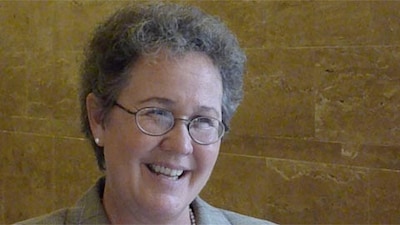Stanford teaching expert Linda Darling-Hammond used a Denver courtroom Friday afternoon to give a seminar on teaching best practices and implementation of standards-based reforms but offered only broad comments about Colorado and its reforms.
Darling-Hammond is perhaps the best known of the national expert witnesses for the plaintiffs in the Lobato v. State school funding case, which ended its third week.

The author of numerous books and articles, Darling-Hammond is former president of the American Education Research Association, advised the 2008 Obama campaign and is known for her critiques of using value-added measures – test scores – in teacher evaluations.
The central claim of the lawsuit is that Colorado’s school finance system doesn’t meet the “thorough and uniform” education requirements of the state constitution.
Plaintiffs’ lawyers Kathleen Gebhardt and David Hinojosa repeatedly questioned Darling-Hammond about the need for more resources to implement standards-based education, close achievement gaps and address other educational challenges. Among her answers were:
- “I think we have a lot of data that resources can and do make a difference,” especially “well and strategically” spent resources.
- “New Jersey become one of the highest achieving states in the country” after a lawsuit forced a change in the funding system.
- “It would be hard to believe” Colorado can successfully implement new content standards “without investments.”
Here’s a sampling of her testimony on other education issues:
Test scores and teacher evaluation: “There’s a lot of concern right now in the research community about the validity of these measures,” which she said have “large error and bias.”
Charter schools: “Charters in general are twice as likely to underperform regular public schools serving similar students.”
Educator collaboration: “The strongest achievement gains come from a team of teachers working together.” (On the use of paraprofessionals, she said there’s “no evidence that [use of] paraprofessionals is the best way boost achievement.”)
Differentiated instruction: Teachers “can’t teach to the middle of the class,” and “differentiated instruction is a set of strategies teachers need to acquire.”
Implementing reforms: “It all comes back to what teachers are able to do.”
Professional development: States can do good professional development “much more efficiently than a lot of little tiny school districts. … The state does have a role in professional development even in local control states.”
Standards: “Standards don’t teach themselves,” and successful implementation of new standards requires retooling of curriculum, lots of staff training and maybe even reorganization of schools.
Unions: She defended the need for master contracts but said that “doesn’t mean you can’t have innovation in compensation.”
Darling-Hammond spent a lot of time talking about international comparisons, saying most other developed nations provide much more professional development funding, equal funding for schools and better induction programs. She also noted that comparisons putting the U.S. high in education spending as a percentage of gross domestic product are misleading because they include the heavy costs of teacher fringe benefits, such as health insurance, which schools don’t pay in other nations.
Darling-Hammond’s testimony tracked many of the points in a written report she prepared for the plaintiffs.
Next Friday, the defense is expected to call its key national witness, another Stanford-affiliated scholar. Eric Hanushek of the Hoover Institution is an economist who takes a different view than Darling-Hammond about education spending.
Families tell their stories
Morning testimony included two parents from Rocky Ford, testifying about the problems and limitations faced by their children. Armandina Ortega and Roberto Pizano, both testifying through translators, said they don’t feel their children will receive adequate academic preparation.
The 862-student district is 78.3 percent free and reduced lunch, 71.1 percent minority and is rated by the state as accredited with priority improvement plan. Read the district’s three-year performance report and its improvement plan.
Highlights of the day:
QUOTE: “I thought was a warrant for me,” joked plaintiff-intervenors’ lawyer Hinojosa after District Judge Sheila Rappaport recessed testimony to deal with warrants in a separate case.
MANEUVERING: Senior Assistant Attorney General Carey Markel’s cross-examination of Darling Hammond was brief. The lawyer asked about the fee paid by Mapleton school district for work by the School Redesign Network ($35,000), with which Darling-Hammond is affiliated; Darling-Hammond’s fees as an expert witness ($300 an hour); whether she interviewed any Colorado district officials for her report (no), and how long she worked as a high school English teacher (one year).
“I have no further questions,” Markel said.
DOCUMENTS: See Darling Hammond’s report, Hanushek’s report and the EdNews archive of Lobato stories.
COLOR: After court adjourned for the day, Darling-Hammond stopped in the corridor of the Denver City and County Building for a video interview with a staff member of the Colorado Education Association.
UPCOMING: The state is expected to begin presenting its case in the middle of next week. Among expected witnesses starting Wednesday are Lt. Gov. Joe Garcia; past and current executives from the Department of Education, including Rich Wenning, Joe O’Brien and Nina Lopez; State Board of Education member Angelika Schroeder; former education Commissioner William Moloney; DPS innovation executive Kristin Waters; and Hanushek.
